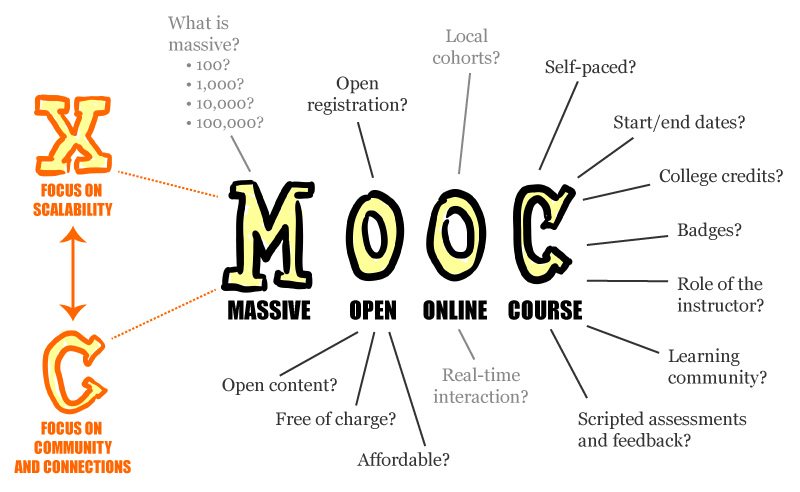
As demand for flexible, affordable education continues to increase, online degrees and MOOCs (Massive Open Online Courses) are gaining popularity. (Check out our latest State of the MOOC report for some hard numbers on the latter.) Traditionally, these two paths occupied separate spheres: online degrees filled the role of fully-accredited pre-professional, undergraduate, and graduate degrees that simulated traditional in-class degrees; MOOCs operated as free individual courses and modules, often featuring specialized training and offered by top-tier universities, but rarely resulting in any formal credential. In short, you had to choose between for-credit and not-for-credit online programs.
But in the last few years, things have started to change. Some universities have started to offer full degrees through MOOCs, and many others offer a range of professional certifications and for-credit tracks like NanoDegrees and MicroMasters.
MOOC Pros: Benefits of For-Credit and Degree-Granting MOOCs

With MOOCs, the usual calling cards of online degrees – flexibility and affordability – are even more pronounced.
Perhaps the best-known case is Georgia Tech’s online MS in Computer Science, the first of its kind to offer 100% MOOC delivery, and which we’ve ranked as the #1 online computer science master’s in the country. The numbers speak for themselves: 6,400 enrolled from over 100 countries, and growing. Why?
Because accredited MOOCs use unique business models, they’re substantially more affordable than traditional on-campus and even online degrees: Georgia Tech’s OMSC costs students $7,000 in total tuition, or one eighth of the cost of its most expensive rival; Tech’s online MS in Analytics costs $10,000. In both cases, limited overhead allows the university to offer MOOCs at a fraction of the cost of other degrees.
Depending on the platform, MOOCs feature pre-recorded lectures as well as a variety of interactive tools like problem sets, unit summaries, and more. Where online degrees graft the in-class experience to an online environment – including live video feeds, collaborative learning, practicum course work, etc. – MOOCs emphasize active student learning and often feature multiple instructors, including professors and industry experts. Illinois at Urbana-Champaign’s online MSC in Data Science includes eight instructors. HEC Paris’s online Master’s in Innovation & Entrepreneurship has over twenty instructors from numerous business backgrounds.
A student-centered approach means MOOCs are highly flexible. All courses are asynchronous and self-paced – you take them according to your own schedule – and most universities offer accelerated delivery and/or part-time enrollment to accommodate a wide variety of adult learners and working professionals. The approach also means success is largely up to the student, though cohorts promote a collaborative aspect and different programs offer different support services. MOOCs work best for highly motivated students interested in practical career-focused disciplines (one reason why most degree-granting MOOCs are master’s programs).
MOOC Alternatives: MicroMasters, NanoDegrees, and Professional Certifications

Most of the major MOOC platforms offer unique credentials, which are beginning to earn recognition in the professional world. While these don’t represent full degrees, they’re generally affordable (cheaper than degrees), accelerated, and cover specialized disciplines.
- edX: Offers three credential series, the most popular of which is the MicroMasters Certificate. Validated by top-tier companies to ensure professional standards, MicroMasters are credit-eligible graduate-level courses that can be applied to accelerate a master’s degree at partner schools like MIT, Harvard, UC Berkeley, University of Texas, Cornell, Princeton, Rice, University of Chicago, and dozens more. Subjects range from sustainable energy to financial management, cybersecurity, robotics, and cloud computing. Partner companies include IBM, Volvo, GE, Amazon Web Services, Amnesty International, Microsoft, Ford, and more. To demonstrate skill proficiency, professional certifications and “XSeries Certificates” are available as well.
- Coursera: Offers professional certificates and MasterTrack certificates, available from University of Michigan in Construction Engineering and Management and UI Urbana-Champaign in Instructional Design and Digital Marketing. Organizational partners include Google, The Museum of Modern Art, Autodesk, Goldman Sachs, The World Bank Group, and more.
- Udacity: Offers their trademark Nanodegree programs, designed to develop students’ coding skills for in-demand careers in areas like data science, machine learning, Android development, marketing, design, iOS, and more. Contrary to the above platforms, Nanodegree courses are taught exclusively in conjunction with industry leaders and professionals rather than university professors, including companies like Facebook, Google, MailChimp, Nvidia, IBM, Amazon, AT&T, Uber, and Lyft. Students also benefit from support services, a career development team, fast-track employment opportunities with hiring partners, and a tight-knit community.
MOOCs Vs. Online Degrees

Despite major advances, for-credit MOOCs still have a ways to go before they catch up with full-time online degrees. First, selection remains limited. Compared to the dozen or so degree-granting MOOCs, online degrees cover nearly every discipline: in-demand fields like computing and technology as well as healthcare, business management, and even arts and humanities. While MOOCs offer excellent non-credit courses in some of these disciplines, platforms and universities have so far stuck to career-focused (tech-heavy) tracks.
Part of this is attributable to adolescent growing pains – after all, MOOCs are new to the online education scene – but the restricted format of MOOCs also tends to dictate subject matter. Student-to-teacher interaction is limited, which means courses have to be comprehensive, 100% online (no internships, field work, etc.) and relatively static or DIY (hence the number of IT, IS, and computer programming MOOCs). In the immediate future, expect to see more degree-granting MOOCs in areas like business, accounting, marketing, and other hard skill-oriented disciplines, hopefully delivered by universities already known for innovation in online education.